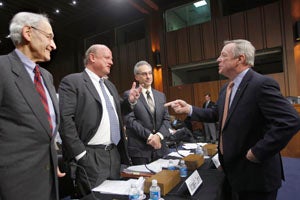Yesterday, the Senate Judiciary Committee chaired a hearing on the constitutionality of the Affordable Care Act and the provision that requires, beginning in 2014, every American to maintain health insurance coverage. The law requires all citizens without work-based insurance to purchase plans in the private market. The hearing comes in the wake of this week’s court ruling that the healthcare law, championed by President Barack Obama ’91, is unconstitutional.
In his testimony before the committee, Charles Fried, Beneficial Professor of Law at Harvard Law School and a former solicitor general under President Ronald Reagan, said that he “is quite sure that the health care mandate is constitutional.”
“To my mind, that is the end of the story,” Fried added. “The mandate is a rule. More accurately, it is part of the system of rules by which commerce is to be governed.” Fried cited precedent in a Supreme Court decision from 1905, Jacobsen v. Commonwealth of Massachusetts, in which the Court accepted the constitutionality of mandatory vaccination laws to protect the welfare of all residents.
Click here to view the full hearing (clips of individual testimonies can be found at C-SPAN.org):
“The only prohibitions I can think of that this bumps up against – the liberty clause is of the 14th and 15th amendment. If that is so, not only is Obamacare unconstitutional but then so is Romneycare in Massachusetts, and that is an example of an argument that proves too much.”
Fried said that in his estimation, the Commerce Clause authorizes the legislation, but he acknowledged that the bill had many problematic components.
Oregon Attorney General John Kroger ’96 agreed. “There can be no dispute that creating an affordable and accessible health insurance market is a legitimate Congressional goal, and one well within the scope of its Commerce Clause authority,” he said.
Walter Dellinger, a solicitor general under President Bill Clinton and currently a visiting professor at Harvard Law School, said the health care mandate was not unprecedented and was “no more intrusive than Social Security or Medicare.”
Michael Carvin, a lawyer in the Reagan Administration, disagreed with Fried and Dellinger on the law’s constitutionality. According to Carvin, Congress overreached its authority with the individual mandate.
“Under Mr. Fried’s analysis,” Carvin noted, “Congress could tomorrow require everyone to buy vitamins or vaccinations.”
Georgetown University Professor Randy Barnett ’77, who also testified, agreed with Carvin, arguing that sovereignty should rest with the citizenry rather than Congressional dictate.
“…If Congress can mandate that you do anything that is convenient to its regulation of the national economy,” Barnett said, “then that relationship is now reversed. Congress would have all the discretionary power of a king, and the American people would be reduced to its subjects.”
He predicted that the Supreme Court would strike down the law in due course.
